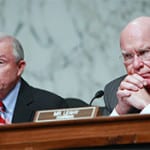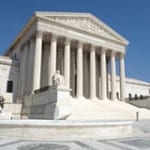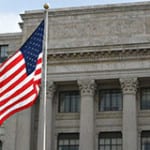
The treatment of captured Americans by the British during the 1775-‘83 Revolutionary War remains largely unexplored in legal scholarship. Until now. Amanda Tyler studies the legal status of colonialists during this upheaval and links it to adoption of the Suspension Clause in the U.S. Constitution.

In his book, On War and Democracy, Chris Kutz examines the moral justifications democracies often invoke to wage war. He argues that war is not a tool to promote egalitarian values and bemoans the slide toward the borderless, seemingly endless campaigns of violence, surveillance, and remote killings.

Catherine Albiston, Lauren Edelman, and Joy Milligan propose a new metaphor for the dispute resolution process: the dispute tree. They say it’s better than the dispute pyramid metaphor because it represents the multiplicity of options, while reflecting the living and evolving nature of disputes.

Dan Farber says the EPA faces a difficult task in crafting regulatory solutions for interstate air pollution. His new paper explains how the practices of upwind states can prevent downwind states from meeting air quality levels mandated by federal law—and how a recent Supreme Court ruling may impact cost assessment.

Professor and legal counsel john a. powell co-authored a friend-of-the-court SCOTUS brief for 35 prominent social scientists, including Dr. Vicki Plaut, in Fisher v. University of Texas. The brief supports the use of race in university admissions policies to achieve diversity and equal opportunity for all students.

In The Double-Edged Sword of Withdrawal Rights, Prof. Ken Ayotte adds to the ongoing debate about corporate bankruptcy. He analyzes companies that try to avoid bankruptcy’s provisions, like the automatic stay on creditor collections, by organizing their major assets into separate legal entities.

As more lawyers file merger suits in states known for favorable verdicts, other states seeking to attract such litigation are awarding higher attorney’s fees and dismissing fewer cases. A paper co-written by Steven Davidoff Solomon says the resulting competition is impacting legal strategies—and judicial rulings.

Analyzing nearly 4,000 Chinese bar exam questions over a 12-year period, Rachel Stern says the test has become explicitly political. Her study shows how the exam rewards answers that convey loyalty to the state, punishes dissent, and mirrors others ways in which China impels public acts that support the ruling party.

The Supreme Court, since 2006, has repeatedly ruled in favor of First Amendment claims against campaign finance regulations. In his review of a book that offers a way to reverse this trend, Bertrall Ross provides an alternative strategy that addresses the court’s concerns about chilling constitutional speech.

In a new paper, Robert Cooter clarifies two theories of law and economics. The first explains the causes and effects of law; the other explains what the law requires people to do. To influence legal thinking, Cooter says, economists must show how these models can improve the interpretation of the law and help predict its consequences.

To best counteract climate change, Eric Biber suggests a priority shift from penalizing carbon emissions to funding clean-energy practices. He co-wrote a new paper that touts promoting green industrial policies through subsidies and tax rebates. Supporting clean energy, it says, builds support for imposing costs on polluting industries.

For Eric Stover, reuniting children who went missing or were abducted during El Salvador’s civil war is hugely gratifying. But as his report shows, reunification brings major challenges for now young adults reintegrating into their biological families. The report offers helpful insights for groups that reunite family members separated by war, natural disaster, and other causes.

Stavros Gadinis looks at transnational regulatory networks in three areas of securities regulation: accounting, cross-border fraud, and money laundering. His case studies show how these informal international networks successfully influence leaders of different countries to adopt desired standards.

Electronic monitoring of juvenile offenders has become a popular alternative to incarceration. While Kate Weisburd sees its visceral appeal, she says the practice is fraught with problems. Her paper notes the lack of judicial oversight of electronic monitoring, and how it fails to lower incarceration rates, rehabilitate youth offenders, or save costs.

The subjugation of Muslim women is often called a troubling aspect of Islam. Leti Volpp, analyzing the book Do Muslim Women Need Saving?, explains why author Lila Abu-Lughod replies “no.” Volpp’s review says readers are shown how not all women prioritize the same values, and how “rescuing Muslim women” has been used as a disingenuous rationale for war.

Anne Joseph O’Connell confronts the rise of failed nominations and delayed confirmations across recent presidential administrations. Her new article details the impact of this trend, shows how it may be diluting the pool of potential nominees, explores why certain agencies are notably susceptible, and proposes various reforms.

Michael Kiparsky and Nell Green Nylen say conventional tactics for managing stormwater fail to curb pollution hazards caused by runoff. Their report urges more green stormwater infrastructure, which mimics natural water retention and treatment processes to minimize the quantity and maximize the quality of runoff to local waters.

Prasad Krishnamurthy says recent mortgage market reforms focus too much on naïve borrowers and will not adequately protect our economy from another housing bubble. His new paper proposes regulations that would reduce exposure to housing risks by limiting borrowing ratios, debt-to-income levels, and other incentives for large-scale loans.

Pamela Samuelson says the freedom to tinker with technologies can lead to many societal benefits. Her article finds that copyright law—which restricts tinkering rights more than other intellectual property areas—should loosen those controls. In particular, Samuelson questions limitations on the right to modify computer programs.

State legislatures routinely ban a given activity, but allow administrative agencies to authorize it under certain terms. Eric Biber acknowledges the pitfalls that such “permit power” can create, but also notes its many advantages. In particular, his paper says regulatory permits can respond well to many complex environmental problems.

In a paper that won an AALS Section on Criminal Justice Junior Scholar Award, Saira Mohamed challenges claims that mass atrocity crimes are too complex for basic criminal law. She says international courts can use criminal law to create aspirations for human behavior—and help us understand how ordinary people can perpetrate extraordinary crimes.

Google has often been accused of manipulating search results to favor its own services. Professor Daniel Rubinfeld examines the core antitrust issues raised by these allegations in an article he co-authored. The paper just won a 2015 Antitrust Writing Award by Concurrences Journal and its jury of leading international academics.

The explosive riots in Ferguson and Baltimore have roots in racist housing laws, policies and regulations, argues Senior Fellow Richard Rothstein. Without suburban integration, something barely on today’s public policy agenda, ghetto conditions will persist, giving rise to harsh policing and the riots that inevitably ensue.

The Supreme Court ruled that if laws have been enacted to protect a group’s interest, the group does not merit extra judicial protection. In 40 years using that standard, however, the Court has not identified one new vulnerable or “suspect” class. A new paper by Bertrall Ross and Su Li offers a more expansive, reliable standard.

Corporate mergers bring about a 90 percent chance of shareholder lawsuits. Most cases settle for minor disclosuresÂand large attorneys’ fees. A new article co-authored by Steven Davidoff Solomon offers a novel way to assess the value of these disclosures, while lowering litigation costs to benefit shareholders.

As multidistrict litigation (MDL) skyrockets, Andrew Bradt says these cases should be pegged to the plaintiff’s proper home district. Bradt’s approach, cited and adopted in a recent federal case, would allow courts to apply choice-of-law rules from the plaintiff’s original state, yet still permit direct filing.

Chris Hoofnagle’s new book Federal Trade Commission: Privacy Law and Policy probes the agency’s colorful 100-year history. Hoofnagle says the FTC has regulated technology from its inception, contrary to popular belief. He explains how its rules influence our daily lives and provide myriad consumer benefits.

To help lawyers keep pace with a fast-changing practice area, Paul Schwartz has co-authored the third edition of Privacy Law Fundamentals. The book tracks new statutes, cases, and enforcement actions. It also explains key state privacy laws and tackles vital issues such as when federal law preempts state law.

In equal protection cases, David Schraub sees a one-way street that needs two-way traffic. His article notes that while judges consider whether certain minority groups qualify as a “suspect class” deserving of heightened judicial review, they should also reassess such designations as times change. If not, Schraub foresees a constitutional doctrine “past its point of expiration.”

Refuting claims that arrests at all ages usually involve just one person, Franklin Zimring says co-offenders are prevalent in most serious youth crimes. Analyzing single and multiple arrests of different offenses in seven states, Zimring and Hannah Laqueur ’13 write that group behavior has a major impact on adolescent crime.

Bertrall Ross says the Supreme Court’s distrust of the political process has led the justices to treat the state like a witness in its own trial. Ross writes that the court’s partisan blocs overly scrutinize lawmakers’ factual records. He argues that this should occur only when there’s proof of democratic malfunction.